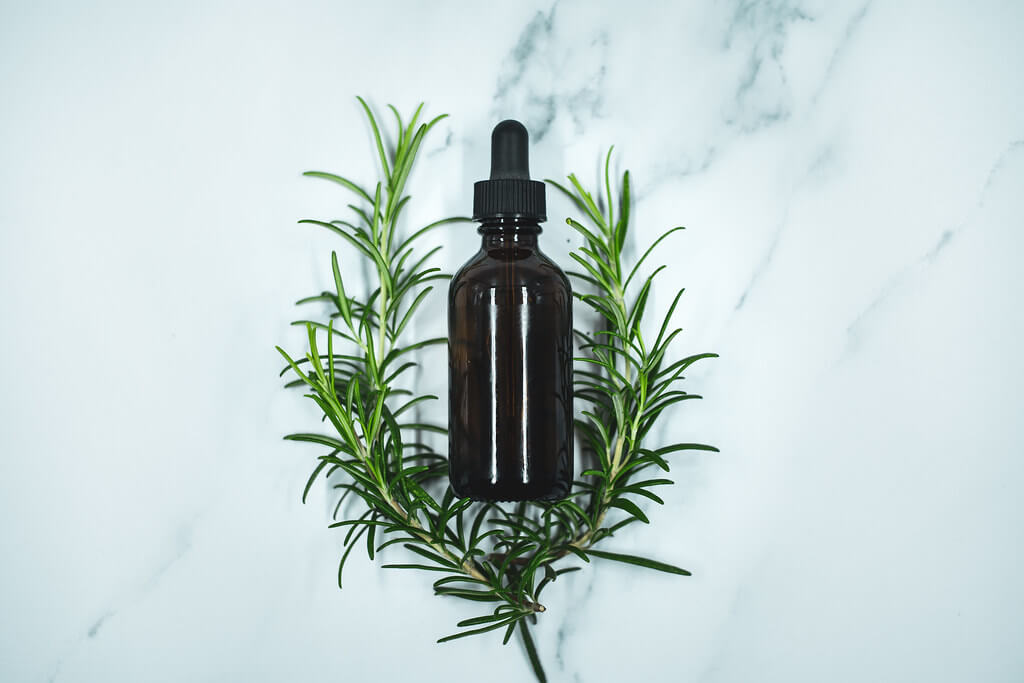
Claire Levenberg is currently the Research & Development Manager for the iLAVA and iLAVAHEMP Brands and the Director of Science Operations for the Downtown and D2 Dispensaries.
She has been in the medical cannabis industry for 3 years now, with in-depth knowledge of Ethanol Extraction, Fractional Distillation, Butane Extraction, lab operations and requirements, and managing daily productions as well as researching new products. Her interests lie in researching new techniques, product development, and educational outreach.
Claire received her Bachelors of Science from the University of Arizona in Plant Sciences with a focus in Microbiology.
Rosemary oil (also known as Rosmarinus Officinalis or dew of the sea) is one of the most versatile herbs around. People have used it as a folk medicine throughout history; historians believe the Ancient Greeks were the first civilization to put the herb to use.
Despite having been around for so long, rosemary oil is only getting more and more popular among the essential oils users. It has a wide range of uses in healthcare, cosmetics, and other areas.
This article will tell you all you need to know about rosemary oil. It will cover what rosemary essential oil is, benefits, how to use it, applications and can you use it for hair loss. We will also discuss some possible side effects and substitutes of the rosemary essential oil.
What Is Rosemary Essential Oil?
Part of the mint family, rosmarinus officinalis is a herb that occurs naturally in a variety of different settings. Rosemary contains carnosic acid, ursolic acid, and rosmarinic acid. It is sometimes called dew of the sea because the word “rosemary” comes from the Latin words “ros” (meaning “dew”) and “marinus” (meaning “sea”).

In order to make rosemary oil, you need to extract the essence of this plant into a carrier oil of some kind. You can then use the finished product in a wide range of ways.
As you will see, rosemary oil is one of the most versatile essential oils around.
How Is Rosemary Oil Extracted & Made?
You can buy rosemary oil from health stores, either in person or on the internet. However, you can also make it yourself if you’d prefer.
If you go for the latter option, the first thing you’ll need to do is pick fresh rosmarinus officinalis. You’ll then need to wash the herb with water and allow it to dry completely.
Once you’ve completed this process, place the rosemary into a mason jar. You should pick a jar you can fill to the very top with the herbs. Make sure there is no more water on the plant. Then, fill the jar to the brim with oil, making sure all of the rosemary is submerged.
At this point, you’ll need to leave the jar sitting in the sun for about a month. Pick the window in your house that gets the most sun and leave your rosemary jar just inside it.
Strain the rosemary oil and store it in a clean container. You can throw out the plant that remains.
How Long Does Rosemary Oil Last?
Rosemary oil can go off quite quickly. Even if you store it in a cool, dry place, it will only retain its potency for around two months. However, you can extend this to six months if you keep the rosemary oil in the refrigerator.
What Does Rosemary Oil Smell Like?
Rosemary leaves have quite a distinctive smell, which makes it somewhat difficult to describe. It has been described as an energetic, herbaceous scent. Most people find it pleasant, which is why rosemary oil has become so widely used in perfume production and aromatherapy.
Rosemary Essential Oil Benefits
Rosemary oil has a hugely diverse range of applications. These relate to healthcare and cosmetics, as well as certain household uses.

Rosemary oil may improve brain function
Some of the most important health benefits of rosemary relate to brain function. People have been inhaling rosemary oil to improve their memory and sharpen their focus since ancient times.
In more recent times, there has been plenty of scientific evidence to support this use of rosemary oil.
This study, for example, recorded a notable improvement in cognitive performance after subjects were exposed to the aroma of rosemary oil.
Rosemary oil helps repel certain bugs
The woody aromatic properties of the rosemary oil leaves work well to repel many different kinds of bugs. Spraying rosemary essence can help to keep mosquitoes away, as well as certain kinds of moths and flies. Thyme is also useful for this purpose.
Rosemary essential oil may help relieve pain
Everyone knows what pain feels like. However, there are many different kinds of pain, some more easily treated than others.
Studies have provided evidence that rosemary oil can comfortably outperform placebos for pain management in laboratory conditions. As an anti-inflammatory, rosemary is particularly effective in treating nociceptive pain issues (such as rheumatoid arthritis).
If you’re one of the estimated 1.5 billion people worldwide who suffer from chronic pain, it might be worth considering complementing your usual pain medication regimen with rosemary oil.
Help perk you up
With everything going on in the world these days, almost everyone will find themselves feeling a little down from time to time in their lives.
If this sounds like your situation, a herbal remedy could be just what you need. Many people describe rosemary oil as energetic and invigorating. It also has the ability to lower blood pressure, though you should seek medical advice before relying on it for this purpose.
Rosemary oil might ease stress
No matter what your situation in life is, you can probably remember a time when your stress levels were out of control. With the various pressures involved in modern life (especially since the onset of COVID-19) managing stress can often feel impossible. This is especially true for those with hectic schedules, like students.
The level of stress you experience in life has close links with your bodily cortisol levels. Cortisol, known as the stress hormone, enters your bloodstream when you encounter an exciting or frightening situation, such as if you just avoided a car accident. Studies have shown that inhaling rosemary oil reduces cortisol levels in adults significantly.
This effect is closely tied to rosemary’s lowering of blood pressure.
Anti-inflammatory & antimicrobial agent
Inflammation is the cause of a host of common issues, both temporary and chronic. Luckily, rosemary oil is an effective anti-inflammatory.
Evidence shows that rosemary oil is particularly effective when it comes to managing joint inflammation and skin irritation.
Experts also class rosemary essential oil as an antimicrobial agent. That means that rosemary oil acts to fight harmful microbes (germs) in the body. Citrus oils are also useful here.
Micro-circulatory stimulant
This sounds somewhat more complicated than it is. It just means that rosemary oil helps to promote the flow of blood through the body’s smallest blood vessels. These vessels fulfill a large number of important functions, including the removal of waste and delivery of nutrients.
This is particularly important where these tiny vessels are situated directly below the skin. If you promote healthy micro-circulation, you will quickly start to notice improvements in your appearance after applying rosemary oil.
Rosemary oil might improve memory
Everyone could use a sharper memory. As noted above, one of rosemary essential oil’s most important benefits is the promotion of brain function, cognition, and recall.
Anecdotally-Recognized Benefits
Aside from the advantages of rosemary oil that scientists have explored through research and clinical studies, there are many that are known through word of mouth in the United States.
Can you use rosemary oil to treat cancer?
Cancer is one of the most common life-limiting conditions in the world nowadays. It can affect any organ in the body; some of the most common cancers are breast cancer, prostate cancer, and lung cancer.
While research in this area remains very limited, there are some signs that rosemary oil may be useful in treating certain forms of cancer. Even if it does not affect tumor size or growth, it could help to reduce inflammatory pain symptoms associated with the condition.
Liver & Digestive Health
When it comes to internal organs’ health, rosemary oil is most closely associated with the liver. It improves liver function in a number of ways. The oil may also be useful in promoting digestive health. It can increase appetite and manage issues like indigestion and flatulence.
Food poisoning
Everyone can remember a time when they ate something they shouldn’t have and had to face the consequences later. Food poisoning isn’t usually dangerous, but it is highly unpleasant.
Many people report that rosemary oil can come in handy when food poisoning strikes. Its calming effect on the system usually serves to settle the stomach.
Antibiotic side effects
If something is “antibiotic,” this means that it has the ability to fight harmful microorganisms.
Generally, if a doctor feels you need an antibiotic, he or she will prescribe a pharmaceutical treatment. However, antibiotic drugs can lose their efficacy if you have to use them repeatedly. If you can supplement traditional antibiotics with a herbal remedy like rosemary oil, you may find that their health benefits last longer.
Studies have shown that rosemary oil can help to fight drug-resistant strains of certain pathogens, including E.coli.
Rosemary Essential Oil for Hair Growth
When it comes to physical appearance, your hair is one of the most important assets you have. If your locks look healthy and strong, it will work wonders for your overall aesthetic.
However, there are many threats to your hair, including cold or rough weather, dietary factors, aging, and hair loss. Rosemary essential oil can be useful in managing these risks.
The folk medicine can promote both the thickness and growth rate of your hair, and increases the generation rate of hair cells.
Can Rosemary Essential Oil Treat Hair Loss?
There are a few different causes of hair loss. The most common is androgenetic alopecia (also known as male pattern baldness).
This hair loss condition affects almost all men at some point in life, with the incidence rate increasing dramatically in older age. Sufferers either get a receding hairline or a diffuse thinning pattern. In the latter scenario, the shape of your head of hair remains the same, but the hair gets thinner and weaker across your scalp, eventually falling out.
Androgenetic alopecia can affect women as well as men. However, it is far less common and looks different when it does occur. A woman may experience thinning of hair across their head, but their hairlines usually do not recede.
Rosemary oil can helps alopecia areata
Alopecia areata is another cause of hair loss. It is different from androgenetic alopecia in that it occurs in both men and women. It also manifests itself differently, causing hair loss in circular patches around the head and elsewhere on the body.
The causes of alopecia areata vary. Some experts believe it arises due to stress in some cases, while others feel it is exclusively an autoimmune disorder.
There is some evidence that rosemary oil might be an effective treatment for hair loss in men; researchers believe it may even be as effective as minoxidil (a popular pharmaceutical treatment for the condition) in increasing hair count. Rosemary oil can also reverse the effects of alopecia areata. Experts are not sure about the mechanisms behind these effects, but they do appear to work.
How Should I Apply Rosemary Essential Oil for Hair Loss?
The best way to treat hair loss with rosemary is to take a few drops of rosemary oil and perform a scalp massage with them. You should leave the oil in place for at least five minutes before having a bath or shower.
You may find it useful to add coconut oil as well. Coconut oil is a very useful carrier oil because of its fatty acid and polyphenol content.
How to Use Rosemary Essential Oil?
There are a few different ways in which you can use rosemary oil. The best option for you will depend on the condition you’re trying to treat, as well as your own personal preferences.
Inhalation
Perhaps the most popular way to use rosemary oil is to inhale it. Simply open the bottle of oil and hold it under your face, allowing the aroma to reach your mouth and nose. You can also use a cloth or tissue to soak up some drops of rosemary oil and inhale it from there.
Inhalation of the rosemary essential oil is the best way to go if you’re trying to bolster your immune system.
Topical Application
Topical treatment is one that you rub on your skin. This is one of the best ways to use rosemary oil, especially if you have an inflammatory skin issue like psoriasis or eczema. Because you’re applying the oil directly to the area with the problem, it’s likely to be more effective than inhaling the fumes.
Those applying rosemary oil topically often use a spray bottle. By adding drops of rosemary oil to a diluting liquid of some kind, you can make the process of topical application much more efficient. You can also use it in massage oil.
Can you ingest rosemary oil?
Some people choose to mix rosemary oil in with their food, or drink small amounts of it. This is generally safe. However, drinking medium to large quantities of rosemary oil is not advised. It can cause issues with a number of different organs, including the stomach, kidneys, uterus, and skin.
You should note that this is usually only a risk with rosemary oil, not the raw plant. Because the active ingredients are present in much higher concentrations in the oil, the risk of having an adverse reaction after consumption increases dramatically.
Other Uses
There are a variety of reasons why people use rosemary essential oil, and many of these have nothing to do with health or wellbeing. We’ve looked at some of the most common miscellaneous applications of rosemary oil below.
Odorous
As noted earlier, rosmarinus officinalis has a completely distinctive taste and smell. Therefore, many people use rosemary extract in perfumes and odorizers.
Cosmetics
Many natural cosmetics brands make use of rosemary oil. Because it’s an anti-inflammatory, it has the ability to address a range of skin issues, including puffiness, redness, and swelling. Also, as noted above, rosemary’s promotion of blood circulation improves the elasticity of skin and keeps it looking healthy.
Aromatherapy
Aromatherapy is a method of treatment that involves using plant extracts to cure given health issues or promote general health. There are a few different aromatherapy techniques you can use; some of these involve applying balms or oils to the skin, while others simply require you to sit in a room with a diffuser or similar device while it emits the fumes of plant extracts.
Aromatherapy is sometimes called essential oil therapy.
Rosemary aromatherapy has a range of potential benefits. As noted above, it works well on issues that arise from inflammation and can be useful in promoting the functions of various organs.
Cooking
Perhaps the most common use of rosmarinus officinalis is in food. People use the raw herb to season meals of many different kinds. Because of its distinctive taste and smell, it adds an effect to meals that would be impossible to achieve otherwise.

The use of rosemary oil in cookery is less common, as the flavor is quite potent compared to that of the raw herb. It can also be risky to ingest concentrated rosemary oil in large quantities, as we discuss below.
Does Rosemary Oil Have Side Effects?
Like any other treatment, there can be certain side effects associated with the use of rosemary essential oil. Eating raw rosemary as part of a meal is safe, and you can ingest up to six grams of the leaf per day for medical purposes without worrying about side effects.
However, if you’re using concentrated rosemary extract, the rules change a little. Drinking undiluted rosemary oil can give rise to a range of health risks, including upset digestion, kidney damage, bleeding of the uterus, and even skin issues like sun sensitivity and increased redness.
Does rosemary oil interact with medications?
There are some interactions you should be aware of between rosemary and prescribed medical treatments. If you’re on anticoagulant drugs or ACE inhibitors, you should not use rosemary oil.
Rosemary essential oil can act as a diruetic. If you’re already on other diuretics, you should avoid rosemary, as it can magnify the effects to an unsafe extent. Also, if you’ve been prescribed lithium for depression, rosemary’s diuretic effect can increase the amount of lithium in your body to a dangerous level. You should therefore avoid it in this scenario as well.
If you have any doubts about whether you’ll be safe taking rosemary, it’s always best to seek medical advice.
Is rosemary oil safe for pregnancy?
There are many essential oils that you shouldn’t use while pregnant. This is because they can cause contractions, which increases your risk of miscarriage. Unfortunately, rosemary is one such essential oil; if you’re expecting a baby, you won’t be able to use it. It may also be unsafe during breastfeeding.
Other essential oils you should avoid while pregnant include clary sage and red thyme. You should refrain from using all essential oils during your first trimester, but experts say that you can start using the likes of lavender, sandalwood, and tea tree thereafter if you wish. These essential oil options can be very helpful in sleep aids during pregnancy.
Substitutes for Rosemary Essential Oil
If rosemary oil isn’t working as you’d hoped, there are plenty of other options you can try. Depending on your specific issue, there could be a range of herbal treatments that might work for you.
If you’re looking to address a hair loss problem, consider using peppermint oil along with rosemary. In one Korean study, researchers found that peppermint oil increased the number of hair follicles in mice in laboratory conditions.
To fight inflammation, there are a number of herbs you can put to work.
Thyme, clove, and helichrysum are some of the best-known anti-inflammatories.
Of course, there’s no rule that says you can only use one essential oil at a time. You can use several, and you can also purchase products that contain a few together.
iLavaHemp Touch is a purpose-formulated CBD cream that contains a number of different essential oils, including rosemary, calendula, and blue tansy. It’s great for aromatherapy and has become very popular for a variety of uses.
Bottom Line
Despite the technological advancements and information available to us nowadays, more and more people are turning to nature when looking for healthcare solutions. Herbal remedies and essential oils pose less of a risk to your health than mainstream pharmaceutical treatments and can be just as effective in some cases.
Research shows that rosemary oil can be used to improve your well-being by relieving pain, easing stress, improving your mood, combating baldness, and acting as an anti-inflammatory agent.
If you think you might benefit from using rosemary oil, give it a try today but don’t forget to consult your health practitioner should you experience any unwanted side effects.
